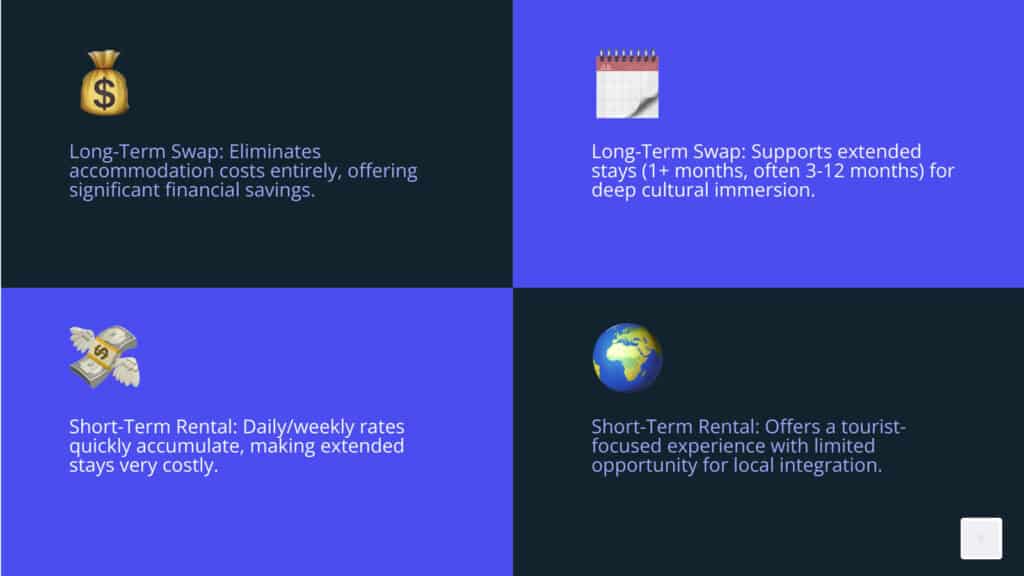

Are you dreaming of living abroad, not just visiting? Imagine truly immersing yourselves in a new culture. Picture working remotely from a vibrant city or taking a well-deserved sabbatical in a charming overseas home.
Traditional short-term rentals and hotels can make extended stays costly and less authentic. But what if there was a way to accept a new life overseas without the high expenses?
An international house swap for the long term offers a transformative solution. It’s more than a vacation; it’s an opportunity to trade homes and cultures, making global living accessible and deeply enriching.
This approach provides unparalleled benefits for remote workers, retirees, and those on sabbatical. It allows for genuine cultural immersion, significant financial savings, and the comfort of a real home.
Whether you’re planning an extended remote work adventure or a dedicated period of study, an academic international home exchange can open doors to incredible experiences.
In this extensive guide, we will explore what defines a long-term swap, its many advantages, how to find suitable partners, and the essential steps to ensure a successful and secure exchange.

The Transformative Benefits of Extended Home Swapping
Engaging in a long-term international house swap isn’t merely about finding a place to stay; it’s about adopting a new lifestyle, open uping significant financial freedom, and enriching your personal and professional journey. For remote workers, retirees, and those on sabbatical, the advantages extend far beyond a typical holiday. We gain not just a temporary residence, but a genuine connection to a new environment and community.

Unprecedented Financial Savings
One of the most compelling reasons to consider a long-term house swap is the profound financial benefit. By eliminating accommodation costs – often the largest expense of international travel – you effectively cut your travel budget in half, or even more. Imagine being able to reallocate thousands of dollars typically spent on hotels or short-term rentals towards local experiences, dining, or even extending your stay.
Consider this: the average global Airbnb nightly price is around $137. For a two-week trip, that’s nearly $2,000. For a long-term stay of several months, these costs skyrocket. A house swap allows you to save 100% of these accommodation expenses. This substantial saving can transform what might have been an unaffordable dream into a tangible reality. It frees up capital for deeper cultural engagement, local excursions, or simply enjoying a higher quality of life during your extended stay.
Cost Category Long-Term Swap (3 months) Hotel (3 months) Short-Term Rental (3 months) Accommodation $0 ~$12,330 ~$8,000 – $10,000 Utilities Variable (negotiated) Included Variable (often extra) Household Essentials Minimal Minimal Moderate Total Estimated Cost Minimal High Moderate to High Note: Hotel and Short-Term Rental costs are estimates based on average nightly rates and can vary significantly by location and property type.
Deep Cultural Immersion
Hotels and short-term rentals, while convenient, often create a barrier between you and the local way of life. A long-term house swap, however, plunges you directly into the heart of a community. You’re not just a tourist passing through; you’re living like a local. This means shopping at neighborhood markets, finding hidden cafes, navigating public transport, and potentially forming connections with neighbors.
This deeper integration allows for a richer, more authentic travel experience. You’ll uncover hidden gems that guidebooks often miss and gain invaluable local recommendations from your exchange partners. For those seeking to practice a new language, living among native speakers provides an unparalleled opportunity for rapid improvement. The everyday rhythms of a different culture become your own, fostering a profound understanding and appreciation that short visits can never achieve. As one home swapper noted, it’s about experiencing the local culture in a way that simply isn’t possible from a hotel room.
Ideal for Sabbaticals, Remote Work, and Research
The unique nature of long-term house swaps makes them particularly appealing to specific demographics:
- Remote Workers: The rise of remote work has untethered many professionals from traditional offices. A long-term house swap offers the perfect solution for a “workation” or an extended period of working from a new, inspiring location. With a fully equipped home, often including dedicated workspaces and reliable internet, you can maintain productivity while enjoying a change of scenery. This flexibility allows for better work-life balance and the opportunity to experience global cultures without sacrificing career continuity.
- Retirees: For retirees looking to explore the world at a leisurely pace, house swapping provides comfort, familiarity, and significant savings. It allows them to spend months in a new country, truly settling in and enjoying local life without the financial strain of continuous hotel stays.
- Those on Sabbatical or Research Trips: Academics and researchers often require extended periods in specific locations for study, writing, or fieldwork. A long-term swap offers a stable, comfortable, and often quiet environment conducive to focused work. Many platforms cater specifically to this need, providing listings that highlight proximity to universities, libraries, or suitable research facilities. The unique advantages of an academic international home exchange mean finding a home that understands and supports your professional needs, offering dedicated workspaces and a peaceful atmosphere for uninterrupted focus.
For these groups, the ability to live in a fully furnished home, complete with kitchen facilities and ample space, far surpasses the limitations of a hotel room. It’s about maintaining a sense of normalcy and routine while starting on an extraordinary international adventure.
Your Step-by-Step Guide to a Successful Long-Term Exchange
Starting on a long-term international house swap requires careful planning and communication. From finding the right partner to finalizing the intricate details, each step is crucial for a smooth and rewarding experience. We’ll guide you through the process, ensuring you’re well-prepared for your extended adventure.

Finding the Right Partner for an Academic International House Swap
The first hurdle is often finding a suitable exchange partner, especially for longer durations. While many platforms exist, the majority of users on general platforms may seek shorter, two-week exchanges. As one community forum user noted, “most families want to swap for two weeks at the longest.” This highlights the need for specialized approaches for long-term swaps.
- Specialized Platforms: Seek out platforms that explicitly cater to longer stays or academic needs. These often attract a demographic more inclined towards extended exchanges, such as other academics, remote workers, or retirees. For instance, platforms focused on sabbaticals naturally draw individuals looking for stays ranging from a few months to a full year.
- Use Search Filters: When browsing listings, make extensive use of filters to specify desired duration (e.g., 3 months, 6 months, 1 year), number of occupants, and specific amenities (e.g., dedicated office space, proximity to universities).
- Flexibility is Key: The more flexible you can be with your dates and destinations, the higher your chances of finding a match. Long-term, simultaneous exchanges can be challenging to coordinate perfectly. Consider non-simultaneous swaps, where you host someone at one time and stay at their home at another, or even hospitality exchanges where you host without a direct reciprocal stay, earning “points” for future travel.
- Patience and Persistence: Securing a long-term swap often takes more time and effort than a short vacation exchange. Be prepared to send multiple inquiries and engage in detailed discussions. As users on a community forum shared, “it can be difficult to secure, and patience is key, as discussions can fall through.” Don’t be discouraged by initial rejections; the right match is out there.
- Identifying Suitable Partners: Look for profiles that indicate a similar lifestyle or need for long-term travel. Retirees, remote workers, or individuals planning their own sabbaticals are often ideal candidates. They understand the nuances of extended stays and are more likely to be flexible.
Crafting an Irresistible Listing and Making Contact
Your home listing is your first impression. For a long-term swap, it needs to be even more comprehensive and appealing.
- Detailed Home Description: Go beyond basic facts. Describe the feel of your home, its unique features, and what makes it special. Highlight practical aspects crucial for long-term living, such as a well-equipped kitchen, laundry facilities, reliable internet speed, and any dedicated workspaces. Mention if your home is quiet, suitable for focused work, or close to amenities.
- High-Quality Photos: Include at least 10 clear, well-lit photos of every main room, including the kitchen, bathrooms, and any outdoor spaces. Show your home as lived-in but tidy, reflecting comfort and care.
- Clear Title and Description: Your title should immediately convey the long-term nature of your offer (e.g., “Charming City Home Available for 6-Month Exchange” or “Academic Retreat: Year-Long Swap Opportunity”). In the description, clearly state your desired duration and any specific exchange preferences.
- Personal Messages: When contacting potential partners, personalize your message. Refer to specific details in their listing that caught your eye and explain why your home would be a good fit for their needs. Introduce yourselves, your family (if applicable), and your travel goals. This “chemistry check” conversation is vital for building trust.
- Setting Expectations: Be upfront about any considerations, such as children, pets, or specific needs related to your home. Conversely, inquire about their expectations for your home.
- Highlighting Academic-Friendly Features: If you’re targeting academics or researchers, emphasize features like a quiet study, fast Wi-Fi, proximity to universities or research institutions, and any relevant resources in your area.
Finalizing the Agreement: The Practical Details
Once you’ve found a potential match and established a good rapport, it’s time to formalize the agreement. A detailed written agreement is paramount for a long-term swap to avoid misunderstandings.
- Key Agreement Points:Dates and Duration: Clearly define the start and end dates of the exchange.
- Utilities: Specify how utilities (electricity, gas, water, internet) will be handled. Will they be included, or will guests be responsible for usage beyond a certain cap?
- Car Usage: If offering a car, discuss insurance, fuel, maintenance, and any restrictions on use.
- Pet Care: If pets are involved, outline responsibilities for feeding, walking, vet visits, and any associated costs.
- Mail Handling: Agree on how mail will be managed – forwarded, held, or discarded.
- Cleaning Expectations: Define cleaning standards upon arrival and departure. Will a professional cleaning service be used, and who covers the cost?
- Maintenance and Repairs: Establish a protocol for minor repairs and who to contact for emergencies.
- Emergency Contacts: Exchange local emergency contacts for both homes.
- Keys and Access: Detail key handover arrangements and access procedures.
- House Rules: Outline any specific house rules (e.g., smoking policy, guest policy).
A comprehensive agreement ensures both parties are on the same page and provides a reference point should any questions arise during the exchange. “Checking references and agreeing to terms” are crucial steps for a successful stay.
Navigating the Challenges of an Academic International House Swap
While incredibly rewarding, long-term international house swaps come with their own set of challenges. Addressing these proactively, with a focus on trust, clear communication, and meticulous planning, can mitigate potential issues and ensure a positive experience for everyone involved.

Building Trust and Ensuring Home Security
Trust is the bedrock of any home exchange, especially for extended periods. When you’re entrusting your most valuable asset to someone for months, vetting becomes critical.
- Vetting Partners Thoroughly: Don’t rush the process. Examine their listing, read their reviews, and look for active participation in the community. Platforms often provide tools for member verification and reviews, which can offer valuable insights into past exchange experiences.
- Checking References: Request references from previous exchange partners. A quick conversation can provide peace of mind and reveal important details about their reliability and respect for property.
- Video Calls: Always conduct video calls with potential exchange partners. This “chemistry check” allows you to get a feel for their personality, discuss expectations face-to-face, and address any concerns. It’s a vital step in building rapport and mutual confidence.
- Home Insurance Policies: Review your homeowner’s insurance policy carefully. Confirm that it covers extended absences and guests. Some exchange platforms offer additional host coverage, which can provide significant peace of mind. For example, some leading platforms offer theft and damage protection up to $1,000,000. It’s essential to understand what your policy covers and what additional coverage, if any, you might need.
- Local Emergency Contacts: Provide your exchange partners with a list of local emergency contacts, including plumbers, electricians, and trusted neighbors or friends who can assist in your absence. Likewise, ensure you have similar contacts for their home.
- Home Preparation: Before leaving, secure valuables, store sensitive documents, and provide clear instructions for appliances, utilities, and any specific house quirks. A detailed welcome guide or binder is invaluable.
Managing Expectations and Communication
Differing standards and cultural nuances can lead to misunderstandings if not addressed openly. Proactive communication is your best defense.
- Differing Standards: What one person considers clean, another might not. Discuss expectations for cleanliness, maintenance, and general care of the home. Be explicit about any non-negotiables.
- Cultural Nuances: Be aware that cultural norms for hospitality, communication, and even household chores can vary widely. Acknowledge these differences and approach them with an open mind and mutual respect.
- Communication Plan: Establish a preferred method and frequency for communication during the swap. Will you check in weekly, monthly, or only for emergencies? Agree on this beforehand.
- Emergency Protocols: Clearly outline what constitutes an emergency and how to handle it. Provide instructions for contacting you and your local contacts in urgent situations.
- Mutual Respect: You are both guests in each other’s homes. Treat their property and possessions with the same care and respect you expect for your own. This mutual understanding is vital for a harmonious long-term exchange.
The Logistics of Living Abroad for Months
Beyond the home itself, living internationally for an extended period involves several practical considerations.
- Visas: Research visa requirements for your destination country well in advance. For long-term stays, a tourist visa may not suffice, and you might need a specific visa type depending on your purpose (e.g., sabbatical, remote work).
- Mail Forwarding: Arrange for your mail to be held, forwarded, or managed by a trusted contact. Similarly, discuss how your guests’ mail will be handled.
- International Banking: Inform your bank of your travel plans to avoid card freezes. Consider setting up a local bank account if your stay is very long, or exploring international banking options that minimize fees.
- Healthcare Considerations: Ensure you have comprehensive international health insurance. Research local healthcare options and emergency services in your destination.
- Local Regulations: Familiarize yourself with local laws and customs, including any specific regulations related to temporary residents or property use. This could include things like waste disposal, noise ordinances, or local taxes.
By addressing these logistical points systematically, you can minimize stress and fully enjoy your long-term international house swap experience.
Frequently Asked Questions about Long-Term House Swapping
As we dig deeper into extended home exchanges, certain questions frequently arise. Here, we address some of the most common inquiries to provide clarity and confidence for your long-term international house swap.
What is considered a ‘long-term’ house swap?
The definition of ‘long-term’ in house swapping can be somewhat fluid and varies among platforms and individuals. Generally, it refers to an exchange lasting significantly longer than a typical vacation. While some community forum users consider anything over two weeks to be long-term, most agree that a long-term swap typically extends beyond one month. For many, particularly those on sabbaticals, remote work assignments, or extended retirement travel, ‘long-term’ often means three months, six months, or even a full academic year (9-12 months).
The key differentiator is the intent behind the stay: it’s about living, working, or studying in a place, rather than just visiting. Flexibility on both sides is crucial for coordinating these extended durations, as finding a perfect, simultaneous, multi-month match can be challenging but highly rewarding.
Do I need special insurance for a long-term home exchange?
Yes, this is a critical consideration. We strongly advise reviewing your existing homeowner’s or renter’s insurance policy well before finalizing any long-term exchange. Here’s why:
- Homeowner’s Policy Review: Many standard homeowner’s policies have clauses regarding extended vacancies or renting out your home. An exchange, while not a rental in the traditional sense, might fall into a grey area. You need to confirm that your policy covers damage or theft while your home is occupied by guests, and while you are away.
- Liability Coverage: Ensure your policy includes adequate liability coverage in case a guest is injured on your property.
- Informing Your Provider: It is paramount to inform your insurance provider about your intention to participate in a long-term home exchange. They may advise on specific riders or additional coverage needed. Failure to disclose this could potentially void your policy in the event of a claim.
- Exchange Agreements: While not insurance, a robust exchange agreement (as discussed earlier) can outline responsibilities and expectations for damages, providing a framework for resolution.
- Travel Insurance: For your personal belongings and health while you are in your exchange partner’s home, comprehensive travel insurance that covers extended stays and medical emergencies abroad is essential. Some home exchange platforms offer their own forms of protection, such as theft and damage protection up to a certain amount, but these are typically supplementary and should not replace your primary home insurance.
Consulting with an insurance professional is always the best approach to ensure you have adequate coverage for all aspects of a long-term international house swap.
Can I arrange a non-simultaneous long-term swap?
Absolutely! Non-simultaneous swaps, also known as hospitality exchanges or points-based exchanges, offer significantly more flexibility and are often a practical solution for long-term arrangements.
- Increased Flexibility: In a non-simultaneous swap, you host a guest in your home at one time, and then travel to their home (or another home within the network) at a different time. This eliminates the often-complex coordination required for both parties to travel and exchange homes at the exact same dates.
- Points-Based Systems: Many platforms operate on a credit or points system. When you host someone, you earn points, which you can then use to “pay” for a stay in another member’s home. This system is particularly beneficial for long-term travel as it broadens your options considerably. You might host several short-term guests to accumulate enough points for a multi-month stay, or find a partner willing to exchange a long-term stay for a significant number of points.
- Requires Trust and Clear Agreements: While more flexible, non-simultaneous exchanges still rely heavily on trust and clear communication. The same principles of vetting, detailed agreements, and mutual respect apply. You’ll need to agree on the terms of the points exchange, the duration of your stay, and all other practical aspects to ensure a smooth experience.
Non-simultaneous exchanges open up a world of possibilities for long-term travel, making it easier to find suitable accommodations that align with your schedule and travel aspirations.
Conclusion: Is a Long-Term House Swap Right for You?
We’ve journeyed through the intricate world of long-term international house swaps, uncovering their profound benefits and practical considerations. It’s clear that this unique mode of travel offers far more than just a place to sleep; it provides a gateway to authentic cultural immersion, significant financial savings, and unparalleled opportunities for personal and professional growth.
For remote workers seeking new horizons, retirees desiring extended global exploration, or academics starting on sabbaticals and research, the long-term house swap presents an empowering alternative to conventional travel. It allows you to live like a local, forge genuine connections, and experience the world through a deeply personal lens, all while maintaining the comfort and familiarity of a home.
However, as we’ve discussed, a successful long-term exchange hinges on meticulous planning, open communication, and a foundation of mutual trust. From finding the right partner and crafting an irresistible listing to navigating insurance complexities and logistical challenges, each step requires careful attention.
If you value authentic experiences over tourist traps, financial prudence over exorbitant costs, and the comfort of a home over impersonal accommodations, then a long-term international house swap might just be your ideal travel solution. It’s a commitment, yes, but one that promises rewards far beyond the monetary. It’s an invitation to truly make the world your home.
Are you ready to trade homes and cultures, and start on an unforgettable journey? The possibilities are as vast as the world itself.









